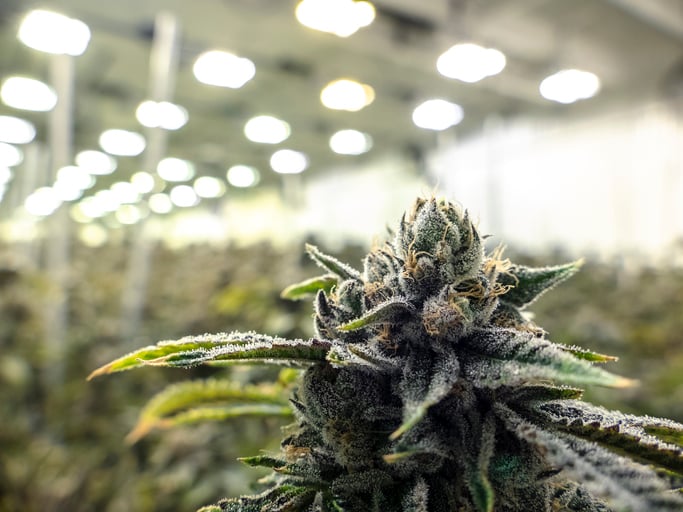There are few industries garnering more attention right now than legal marijuana, and it's not hard to understand why. Over the next decade, sales for the green rush could grow more than 18-fold, if the most aggressive sales estimate on Wall Street come to fruition. These estimates, along with well-known demand in the black market, has Wall Street and investors very excited about the potential for pot stocks.
With legal marijuana being such a new concept, there's plenty of market share up for grabs in Canada, Europe, and the crown jewel of the cannabis movement, the United States. That means marijuana stocks big and small have been more than willing to spend aggressively to gobble up as much market share as possible.
There's only one problem Cannabis stocks are burning through their cash at an alarming rate. This has been especially true of marijuana's "Big Four": Canopy Growth (CGC 1.64%), Aurora Cannabis (ACB 0.71%), Tilray (TLRY +0.00%), and Cronos Group (CRON 1.16%).

Image source: Getty Images.
Canopy Growth
If I didn't know any better, I'd think Canopy Growth, the largest marijuana stock in the world by market cap, was spending Monopoly money. Since the beginning of the year, Canopy Growth's cash, cash equivalents, and short-term investments has declined by 1.77 billion Canadian dollars. The bulk of Canopy's war chest is the result of a $4 billion equity investment (about CA$5 billion at closing) that closed in November from Modelo and Corona beer producer Constellation Brands.
Part of this decline can be attributed to Canopy's numerous acquisitions. Having already acquired Colorado-based intellectual property company ebbu, Canopy has also agreed to buy Acreage Holdings on a contingent-rights basis for $3.4 billion, when announced. Though this deal is primarily being paid for with Canopy's stock, it'll still involve Acreage shareholders receiving $300 million in cash, or $2.55 per share, up front.
Canopy has also spent liberally on pushing into new markets, especially the United States. Plans are for $150 million to be spent on a hemp-processing facility in New York State following the award of a processing license in January. Coupled with growing administrative and marketing expenses, Canopy's once unsurpassable war chest isn't nearly as large as it once was.

Image source: Getty Images.
Aurora Cannabis
Although Aurora Cannabis has yet to report its results for the fiscal fourth quarter, ended in June, the company's third-quarter report featured cash used in operating activities of CA$187.6 million. Mind you, Aurora Cannabis does have capital at its disposal, with a $750 million shelf offering (that's U.S.), as well as the recent disposition of its stake in The Green Organic Dutchman.
What's worked in Aurora's favor is that the company's aggressive inorganic growth strategy hasn't involved much in the way of cash outlays. Since completing its CanniMed purchase early in 2018, Aurora has almost exclusively bought other businesses by using its stock as capital. While this is dilutive to existing shareholders, it ensures that the company's cash pile lasts longer.
The concern is that as Aurora's business and employee count grow, so will its expenses and cash needs. Again, Aurora does have access to cash via its shelf offering, and it raised a tidy sum by disposing of its TGOD investment. Nevertheless, its existing war chest appears to be dwindling.

Image source: Getty Images.
Tilray
It's a similar story with Tilray, which has seen its aggregate cash, cash equivalents, and short-term investments shrink by $296.7 million since the year began (Tilray reports in U.S. dollars).
As with its peers, Tilray has been active on the acquisition front, albeit not to the same degree as Aurora Cannabis or Canopy Growth. Tilray's purchase of hemp-foods company Manitoba Harvest in March is important in that it'll give the company access to more than 16,000 retail doors throughout North America. These retail doors will be pivotal in helping Tilray distribute cannabidiol products in Canada and the United States.
Tilray also announced a $32.6 million investment in May that'll see the expansion of 203,000 square feet in production and processing space.
Between its acquisition of Manitoba Harvest, its capacity expansion, and rising administrative and sales expenses, Tilray has been losing money and burning through its cash pile at an extraordinary pace. Further, the company's losses are unlikely to ease anytime soon, with Tilray now focusing its attention on the U.S. and Europe, as opposed to Canada. In my opinion, this increases the likelihood of Tilray needing to raise capital in the not-so-distant future.

Image source: Getty Images.
Cronos Group
Lastly, there's Cronos Group, which has recently upped its spending.
Like Canopy Growth, Cronos Group had the fortune of landing a major equity investor in tobacco giant Altria. In March, Cronos Group went from having less than $25 million in cash to its name to having closer to $1.8 billion, in exchange for Altria owning a non-diluted 45% stake in the company.
However, since the beginning of the year, Cronos Group has used CA$76 million in cash for operating activities, and recently announced the acquisition of Redwood Holdings for $300 million (again, U.S.). Normally, marijuana stocks utilize their common stock as collateral for these deals, but Cronos will be using $225 million in cash to pay for its newest portfolio puzzle piece. Inclusive of operating costs, it would not be surprising if Cronos Group's cash position has shrunk to $1.5 billion from $1.8 billion in just over a three-month period, once the Redwood deal is finalized.
With supply issues haunting Canadian growers and these supply chain concerns not expected to ebb anytime soon, cash could become a scarcer commodity among Canada's "Big Four."








